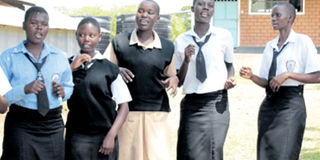Pregnant girls need help to stay in school

Students at Nyajanja Secondary School in Homa Bay County during the institution’s Education Day on May 28, 2-15. The school is among the institutions in the county that have managed to reduce teenage pregnancies among students. PHOTO | VERAH OKEYO | NATION MEDIA GROUP
What you need to know:
- When a teenage girl becomes pregnant, her prospects change drastically, and rarely for the better.
- Her education comes to an abrupt end and her prospects for future employment or entrepreneurship fade.
- Consequently, she becomes vulnerable to poverty, exclusion, and dependence.
In the past few weeks, there have been media reports of many schoolgirls being confirmed to be pregnant in various parts of the country.
Perhaps the most heart-wrenching is that of a primary school in Kwale county where it was reported that for six years, no girl has transitioned to secondary school. This was attributed mainly to teenage pregnancy and early marriage.
These reports, coming hot on the heels of a World Bank report ranking Kenya among the countries with the highest rates of jobless citizens between the ages of 15 and 24, paint a gloomy future for Kenya’s socio-economic prospects.
When a teenage girl becomes pregnant, her prospects change drastically, and rarely for the better. In most cases, her education comes to an abrupt end and her prospects for future employment or entrepreneurship fade. Consequently, she becomes vulnerable to poverty, exclusion, and dependence.
A lot of energy and resources dedicated to preventing early pregnancy have focused on girls aged between 15 and 19 years. While this is an important age group, girls aged 14 and below are left exposed and face an elevated level of risk of complications and death from pregnancy and childbirth.
This group of very young adolescents is typically overlooked, often because they are forced into marriage. Deliberate efforts should be made to bring these very young adolescents into the conversation about teenage pregnancy.
A pregnant teenage girl is very likely going to be pressured or forced to leave school. Without education, the girl has limited access to employment. This consigns her to a life of poverty where her children are malnourished and unhealthy.
The children of these teenage mothers will most likely not get a good education as they may have to stay at home to help their mothers in supplementing family income. So when their turn to bear children comes, they find themselves perpetuating the poverty cycle.
INEQUALITY DECLINES
Studies indicate that inequality declines as the average level of educational attainment increases, with secondary education producing the greatest payoff, especially for women.
There is considerable evidence that even in settings where people are deprived of other essential services such as sanitation or clean water, the children of educated mothers have much better prospects of survival than the children of the uneducated ones.
Education is, therefore, a powerful factor in levelling the field of opportunity as it provides individuals with the capacity to obtain a higher income and standard of living.
A study by the Centre for the Study of Adolescence found that 13,000 girls in Kenya leave school every year due to pregnancy. It further showed that while only 35 per cent of girls between the ages of 16 and 20 are in school, 50 per cent of the boys attend. Yet enrolment of boys and girls in lower primary is almost equal.
In order to reduce youth unemployment in Kenya, we must urgently address the issue of dropout rates affecting school-going girls.
We must implement policies to help girls stay in school. Interestingly, Kenya has enacted various educational policies meant to keep girls in school. One such policy is the educational re-entry for girls after teenage pregnancy.
This policy was meant to promote the education of girls and help the country towards the attainment of education for all Kenyans. It supports young mothers to continue schooling after delivery. Through this policy, the government hoped to increase the number of young mothers who continued schooling after delivery.
It is, therefore, vital for action to be taken to prevent teenage pregnancies and equally important to help those affected get their education back on track.
Dr Kamau is the country director, Deutsche Stiftung Weltbevoelkerung Kenya. [email protected]




